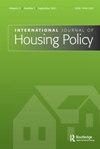A systematic review of the relationship between publicly subsidised housing, depression, and anxiety among low-Income households
IF 2.6
2区 经济学
Q3 ENVIRONMENTAL STUDIES
引用次数: 2
Abstract
Abstract Background: Housing affordability is one of the most pervasive social determinants of physical and mental health in many parts of the world. To date, some housing scholars have looked at public housing interventions as a mechanism for increased affordability. However, their findings have not been synthesised and it is still unclear as to whether these interventions improve mental and physical health. Method: The present study is a systematic review of quantitative studies conducted over the past 25 years that assess the impact of publicly subsidised housing on mental health. In total, 1886 studies were identified from a structured search of four databases. Included articles were peer-reviewed sources that quantitatively measured the relationship between mental health and publicly subsidised housing interventions. Results: In total, 6 studies met the inclusion criteria for this review. Evidence on mental health benefits from publicly subsidised housing was inconsistent, and depended on the specific housing subsidy programme, type of housing assistance, housing stability, and neighbourhood quality. Conclusion: This review identified a need for more rigorous studies to gain a better understanding of the conditions needed for housing affordability policies and programmes to positively contribute to mental health.对低收入家庭中公共补贴住房、抑郁和焦虑之间关系的系统回顾
背景:在世界许多地方,住房负担能力是影响身心健康的最普遍的社会因素之一。迄今为止,一些住房学者将公共住房干预视为提高负担能力的一种机制。然而,他们的研究结果尚未综合,这些干预措施是否能改善心理和身体健康仍不清楚。方法:本研究是对过去25年进行的评估公共资助住房对心理健康影响的定量研究进行系统回顾。通过对四个数据库的结构化搜索,总共确定了1886项研究。纳入的文章是同行评议的来源,定量衡量了心理健康与公共补贴住房干预之间的关系。结果:共有6项研究符合本综述的纳入标准。关于公共补贴住房对精神健康有益的证据并不一致,这取决于具体的住房补贴方案、住房援助类型、住房稳定性和社区质量。结论:本综述确定需要进行更严格的研究,以更好地了解住房负担能力政策和方案对心理健康作出积极贡献所需的条件。
本文章由计算机程序翻译,如有差异,请以英文原文为准。
求助全文
约1分钟内获得全文
求助全文
来源期刊

International Journal of Housing Policy
Multiple-
CiteScore
5.80
自引率
14.30%
发文量
42
期刊介绍:
The International Journal of Housing Policy aims to be the leading forum for the critical analysis of housing policy, systems and practice from a social science perspective. It is published quartely. We welcome articles based on policy-relevant research and analysis focused on all parts of the world. We especially encourage papers that contribute to comparative housing analysis, but articles on national or sub-national housing systems are also welcome if they contain data, arguments or policy implications that are relevant to an international audience.
 求助内容:
求助内容: 应助结果提醒方式:
应助结果提醒方式:


